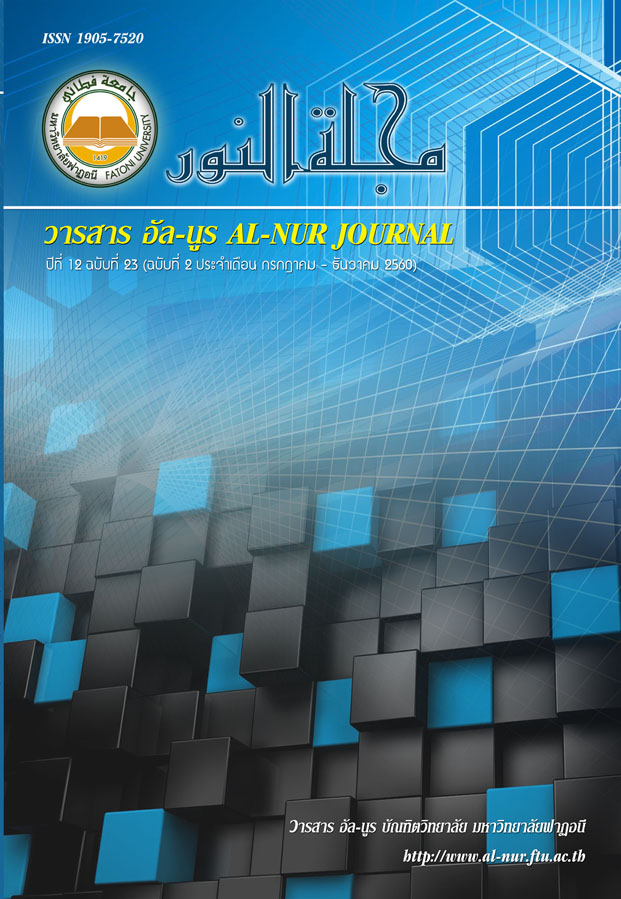การศึกษาขอบเขตคุณภาพชีวิตของผู้ได้รับผลกระทบจากเหตุการณ์ความไม่สงบใน 3 จังหวัดชายแดนภาคใต้: กรณีศึกษา อำเภอรามัน จังหวัดยะลา
Keywords:
ขอบเขตคุณภาพชีวิต, ผู้ได้รับผลกระทบจากเหตุการณ์ความไม่สงบAbstract
บทคัดย่อ
การวิจัยครั้งนี้มีวัตถุประสงค์เพื่อศึกษาขอบเขตคุณภาพชีวิตของผู้ได้รับผลกระทบจากเหตุการณ์ความไม่สงบใน 3 จังหวัดชายแดนภาคใต้ กรณีศึกษา อำเภอรามัน จังหวัดยะลา เป็นการวิจัยเชิงพรรณนา ผสมผสานระหว่างเชิงปริมาณ และเชิงคุณภาพ เป็นการศึกษาภาคตัดขวาง เลือกกลุ่มตัวอย่างเฉพาะเจาะจง อายุ 15 ปีขึ้นไป จำนวน 423 ราย เก็บรวบรวมข้อมูลโดยใช้เครื่องมือในการสัมภาษณ์ และเครื่องมือในการสนทนากลุ่ม
ผลการวิจัยพบว่า ขอบเขตภาพรวมของคุณภาพชีวิตผู้ได้รับผลกระทบฯ กลุ่มตัวอย่างเห็นด้วยกับขอบเขตที่กำหนดโดยองค์การอนามัยโลกว่ามีความครอบคลุมในทุก ๆ ด้าน ทั้งด้านร่างกาย ด้านจิตใจ ด้านความสัมพันธ์ทางสังคม และด้านสิ่งแวดล้อม เพื่อความครอบคลุมและสอดคล้องกับบริบทภาคใต้ ควรเพิ่มขอบเขตคุณภาพชีวิตด้านศาสนา จิตวิญญาณ ความเชื่อ และหลักปฏิบัติตามหลักศาสนาอิสลาม ในขอบเขตภาพรวมของคุณภาพชีวิตฯ จำแนกรายด้านได้ ดังนี้ 1. คุณภาพชีวิตด้านร่างกาย ควรเพิ่มการออกกำลังกาย และความเจ็บป่วยที่เกิดจากสถานการณ์ความไม่สงบฯ 2. คุณภาพชีวิตด้านจิตใจ ควรเพิ่มความเชื่อ ศาสนา จิตวิญญาณ 3. คุณภาพชีวิตด้านความสัมพันธ์ทาง ควรเพิ่มการมีอิสระในการใช้ชีวิต และการปฏิบัติศาสนากิจ 4. คุณภาพชีวิตด้านสิ่งแวดล้อม ควรเพิ่มสถานการณ์ความไม่สงบใน 3 จังหวัดชายแดนภาคใต้ ผลการศึกษาครั้งนี้ สามารถนำไปใช้เป็นข้อมูลพื้นฐานในการพัฒนาเครื่องมือชี้วัดคุณภาพชีวิตฯ และนำไปใช้พัฒนาคุณภาพชีวิตผู้ได้รับผลกระทบฯ ต่อไป
ABSTRACT
This study aimed to explore the scope of quality of life of people affected by the unrest in the three Southern border provinces: a case study of Raman District, Yala Province. This cross-sectional study is mixed methods research conducted with 423 subjects aged 15 years and over recruited using purposive sampling. The research instruments were interviews and focus groups.
Overall, the subjects agreed with the scope of quality of life set up by WHO that quality of life covers the person’s state physically, psychologically, socially, and environmentally. To cover and correspond with the southern context, the scope should include quality of life related to Islamic religion, spirituality, beliefs and practice.
The scope of quality of life among people affected by the unrest was found as follows: 1. physically, quality of life should include exercise, and illnesses resulting from the unrest; 2. psychologically, it should include beliefs, religion, and spiritual welfare; 3. socially, it should include freedom for living and practicing religion; and 4. environmentally, the unrest in the three Southern border provinces should be included. The results of this study could be used as basic information for development of a tool indicating quality of life of the people in the areas, for development of guidelines for quality of life promotion, and for formulating policies and measures corresponding with quality of life of people affected by the unrest so that they could exist happily physically and mentally in the society and the environment leading to good quality of life.



